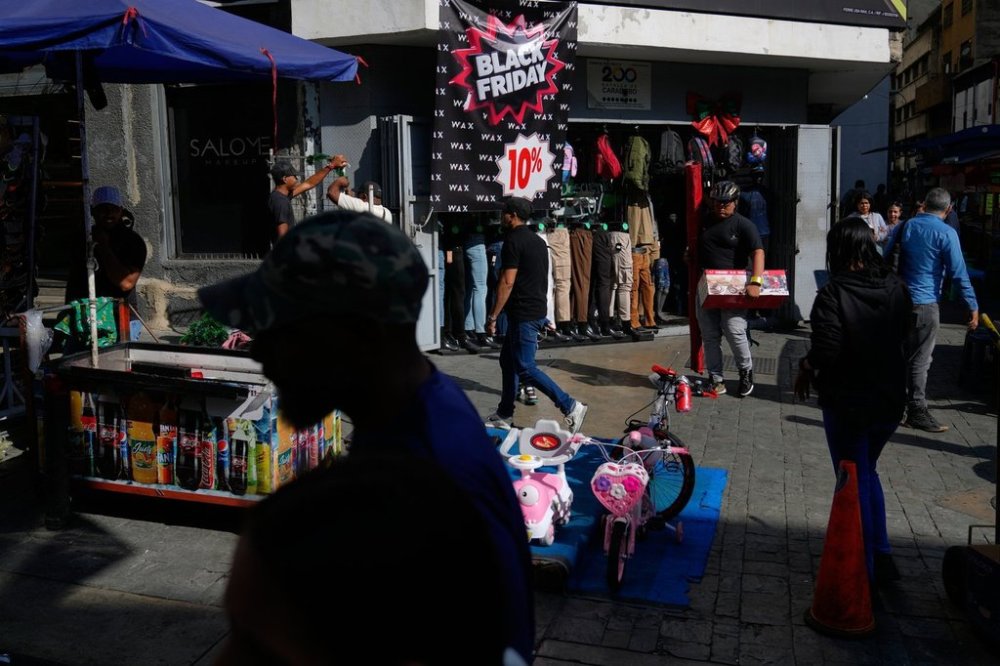Venezuelans worried about economic turmoil shun Black Friday deals
Advertisement
Read this article for free:
or
Already have an account? Log in here »
To continue reading, please subscribe:
Monthly Digital Subscription
$0 for the first 4 weeks*
- Enjoy unlimited reading on winnipegfreepress.com
- Read the E-Edition, our digital replica newspaper
- Access News Break, our award-winning app
- Play interactive puzzles
*No charge for 4 weeks then price increases to the regular rate of $19.00 plus GST every four weeks. Offer available to new and qualified returning subscribers only. Cancel any time.
Monthly Digital Subscription
$4.75/week*
- Enjoy unlimited reading on winnipegfreepress.com
- Read the E-Edition, our digital replica newspaper
- Access News Break, our award-winning app
- Play interactive puzzles
*Billed as $19 plus GST every four weeks. Cancel any time.
To continue reading, please subscribe:
Add Free Press access to your Brandon Sun subscription for only an additional
$1 for the first 4 weeks*
*Your next subscription payment will increase by $1.00 and you will be charged $16.99 plus GST for four weeks. After four weeks, your payment will increase to $23.99 plus GST every four weeks.
Read unlimited articles for free today:
or
Already have an account? Log in here »
CARACAS, Venezuela (AP) — Window displays advertising 30% discounts and shoes for $20 were not enough to draw throngs of bargain hunters this Black Friday to a popular mall in Venezuela’s capital. Even the newly opened H&M store was virtually empty in the morning.
The country’s suffocating economy, Venezuelans said, not the threats of U.S. military action, is to blame for Friday’s stark contrast to other post-pandemic years when enthusiastic shoppers formed lines outside stores. Years of experiences riding the twists and turns of their country’s complex crisis have taught them to focus on their immediate individual needs, like buying food or medicines, and not the collective long term, like a possible military strike.
“The country’s economy is based on day-to-day survival. What do I do to survive today and live tomorrow?” physician Luisa Torrealba said outside an appliance store. “We don’t have the luxury of stopping because there’s going to be a war, because there’s a psychological war going on, because the government says one thing or the United States says another.”

A day earlier, U.S. President Donald Trump increased pressure on his Venezuelan counterpart, Nicolás Maduro, by suggesting during a Thanksgiving address to troops that the military could “very soon” begin hitting alleged drug-trafficking targets within the South American country. So far, a monthslong U.S. military operation has killed 80 people in strikes against vessels in international waters in the Caribbean and eastern Pacific.
Some of the alleged drug-running boats hit by the military since early September had gone out to sea from Venezuela.
Since returning to office, Trump has increased the pressure on Maduro and his allies, including by doubling to $50 million the reward for information that leads to his arrest on narcoterrorism charges. Maduro, who denies the accusations, and his allies have repeatedly said that the U.S. military operation is designed to force a government change in Venezuela.
But while White House evaluates if and when to strike on Venezuelan soil, the country’s economy continues to suffer and millions of Venezuelans struggle to buy food.
The International Monetary Fund reported that Venezuela’s annual inflation rate was 270% last month.
Families these days need more than $500 to buy the basics for a month. Yet, Venezuela’s monthly minimum wage of 130 bolivars, or $0.52, has not increased since 2022, putting it well below the United Nations’ measure of extreme poverty of $2.15 a day.
Many public sector workers survive on roughly $160 per month, while the average private sector employee earned about $237, according to the independent Venezuelan Observatory of Finances.
On Friday, Marian García expected to see a crowd outside a shoe store at the mall in Caracas where she wanted to buy a pair of boots. But she found herself being the first in line.
The store’s windows promised shoes for $20, an unbeatable deal for García, who had set her eyes on boots that regularly range from $60 to $80, or more than 10% of the monthly combined income with her partner.
“It’s difficult to indulge in luxuries,” García, 26, said. “Due to the current economic situation, people are cutting back and only spending on the essentials, such as food.”
Yarbelis Revilla, who works three jobs and considers herself a master bargain hunter, also looked around the mall for deals on shoes. She checked out offers at different stores but in the end felt that many of this year’s Black Friday discounts did not feel like a steal.
Amid the country’s conditions, Revilla explained that looking for shoes may seem like “vanity,” but she works hard to meet her needs and does not dwell on the future.
“I am a Christian, and the Bible says, ‘Do not worry. Do not make plans for the future because you won’t really know what’s coming,’” she said.

